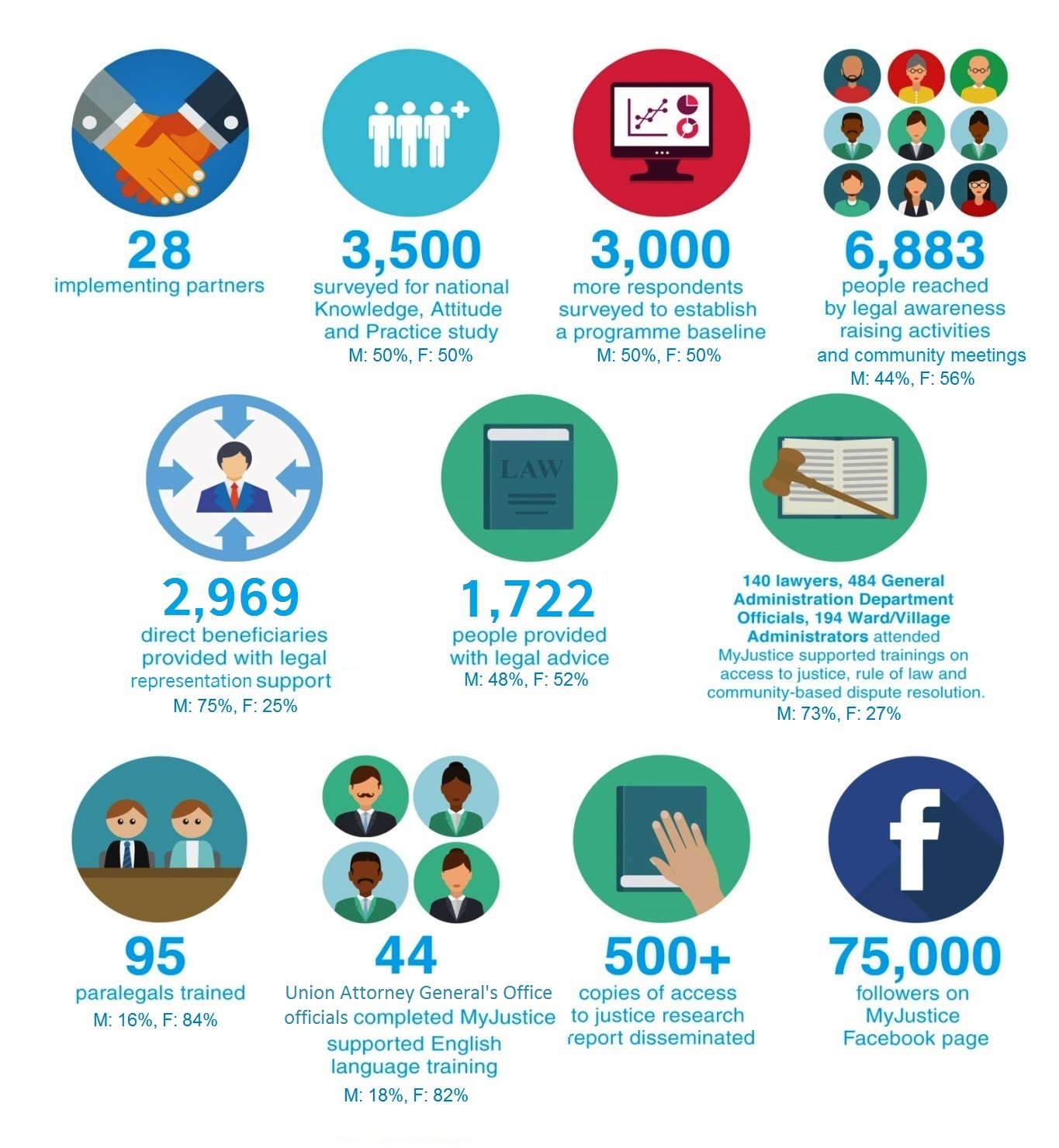RESULT AREA 1. KNOW YOUR RIGHTS
MyJustice is working towards incresing capacity within communities to understand and apply rights.
MyJustice is partnering with a range of civil society and international organisations to promote community-centred intiatives to strengthen legal awareness among people.
Activities cover a variety of rights-related themes and multiple methods and tools are being used to improve legal awareness; ranging from participatory community ourtreach, theatre, peer education as well as community-based campaigns. Issues covered include women's rights, child rights, LGBT rights, land rights, labor rights, human rights and other associated rights.
The programme also builds awareness on justice-related issues nationally through mainstream media platforms. In collaboration with media professonals, MyJustice is producing a second television series of The Sun, The Moon and The Truth and will be launching a coordinated multi-media campaign to promote a public dialogue on justice related issues.
RESULT AREA 2. MEET JUSTICE NEEDS
My Justice ensures that justice services are available, are of a high standard and meet the needs of communities
The programme supports six justice centres providing free legal representation and advice for the poor and vulnerable. These centres are currently operational in Yangon, Mawlamyaing, Taunggyi, Mandalay, Hpa-An and Taungoo. Each justice Centre provides free legal representation to individuals accused of Crimes as well as legal advice. Based on this work, MyJustice will generate valuable data about how the criminal justice system works. This can inform the design of any future statefunded legal aid scheme.
Capacity strengthening activities are integral to this result area and have been tailored for lawyers, law students in universities as well as paralegals at the Community level. A key priority is to train lawyers on domains such as legal empowerment, client-centred law, rights protection of the accused and the responsibilities of legal aid lawyers.
The programme also supports eight partner organisations to run paralegal Components in their work, including legal awareness, assistance, case accompaniment and management.
RESULT AREA 3. STRENGTHEN COMMUNITY JUSTICE
My Justice is ensuring that fair approaches are used in community-based dispute resolution processes
MyJustice works with the grain of existing systems, forums and mechanisms that have legitimacy at the local level, supporting them to meet the needs of the people they serve.
Research commissioned by the programme shows that Community endorsed dispute resolution systems are used widely in Myanmar to settle disputes; Ward/Village Tract Administrators (WWTAs) are consistently shown to play a central role as mediators at the frontline, resolving disputes at the community level.
As a response MyJustice trains WWTAS to become effective mediators and to ensure their delivery of justice is fair and inclusive. In partnership with UNDP, MyJustice also engages with the General Administration Department (GAD), including through training for township level Deputy Staff Officers across the country on dispute resolution principles and skills.
The programme also reaches out to village leaders, elders and other Community representatives involved in resolving disputes, to improve justice outcomes for vulnerable individuals facing housing, land and property related disputes.
RESULTS AREA 4. EVIDENCE TO ENGAGE
My Justice shares evidence and knowledge to inform justice policy development and implementation
The My Justice evidence journey starts at the community level and is used strategically to engage a range of audiences: government bodies, the media, donors, researchers and Organisations Working at the grass roots.
Evidence is gathered while delivering the programme and through commissioned research. It is used to understand what Works and what doesn't in access to justice programming in Myanmar and to add to the knowledge base on justice issues.
MyJustice engages policy makers at multiple levels to inform justice policy development and implementation, using evidence from community-based research, Making Big Cases Small and Small Cases Disappearand results from a national survey of over 3500 respondents about their knowledge, attitudes and practices related to justice.
The programme convenes policy dialogues with other organisations to ensure that evidence is presented to change agents in a Coordinated manner for strategic outcomes. Building partners' capacity to collate and communicate evidence for policy makers is a key activity in this result area. As one of the advisors to the Union level Rule of Law Centres and Justice Sector Coordination Body (JSCB), MyJustice is an established leader in this area.
